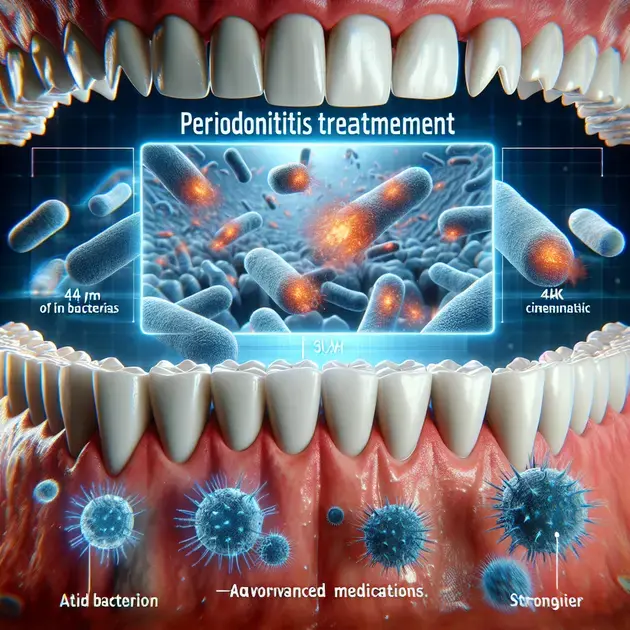When it comes to combating periodontitis, finding effective medication is crucial for achieving optimal oral health. In this comprehensive guide, we will explore the various treatment options available to address this common dental condition.
Periodontitis, also known as gum disease, affects a significant portion of the population and can lead to serious oral health issues if left untreated. By understanding the different medications and their effectiveness in treating periodontitis, you can take proactive steps towards improving your oral hygiene and overall well-being.

Understanding Periodontitis Medications
Periodontitis is a serious gum infection that damages the soft tissue and destroys the bone that supports your teeth. Understanding the medications used to treat this condition is crucial for effective management. Here, we will discuss the commonly prescribed medications for periodontitis and how they work to combat the infection.
1. Antibiotics:
Antibiotics are often prescribed to control bacterial infections in periodontitis. One common antibiotic is doxycycline, which can be taken orally or applied directly to the infected area. Apps like WebMD provide detailed information on different antibiotics used for periodontitis.
2. Antiseptic Mouthwash:
Antiseptic mouthwashes containing chlorhexidine are effective in reducing plaque and controlling bacterial growth in the mouth. Websites like Colgate offer guidance on choosing the right antiseptic mouthwash for periodontitis treatment.
3. Enzyme Suppressants:
Enzyme suppressants like subantimicrobial dose doxycycline (SDD) can help reduce inflammation and prevent further damage to the gums and bones. Platforms like Mayo Clinic provide insights into the use of enzyme suppressants for periodontitis.
4. Pain Relievers:
Pain relievers such as ibuprofen may be recommended to alleviate discomfort associated with periodontitis. Apps like Drugs.com offer information on the dosage and possible side effects of pain relievers for periodontal pain.
5. Herbal Remedies:
Some individuals opt for herbal remedies like tea tree oil or turmeric to complement traditional periodontitis treatment. Websites like Healthline provide insights into the effectiveness of herbal remedies in managing gum disease.
Choosing the Right Treatment Plan
Developing a personalized treatment plan for periodontitis is essential for long-term oral health. By considering various factors, such as the severity of the condition and individual preferences, you can select the most suitable treatment approach. Let’s explore the steps to choosing the right treatment plan for periodontitis.
1. Consultation with a Periodontist:
Schedule a consultation with a periodontist to have a comprehensive examination of your gums and teeth. Apps like Zocdoc can help you find and book appointments with experienced periodontists in your area.
2. Assessment of Periodontal Health:
Undergo a thorough assessment of your periodontal health, including measuring pocket depths and analyzing X-rays. Websites like American Academy of Periodontology offer resources on understanding periodontal health assessments.
3. Customized Treatment Options:
Based on the assessment results, work with your periodontist to develop a customized treatment plan that may include scaling and root planing, periodontal surgery, or laser therapy. Platforms like American Academy of Periodontology offer insights into different treatment options for periodontitis.
4. Maintenance and Follow-Up:
Follow the prescribed treatment plan diligently and attend regular follow-up appointments to monitor the progress of your periodontal treatment. Apps like Remind can help set reminders for medication schedules and dental visits.
5. Lifestyle Changes:
Implementing healthy lifestyle changes, such as quitting smoking, improving oral hygiene practices, and adopting a balanced diet, can support the effectiveness of your treatment plan. Websites like MouthHealthy provide tips on maintaining good oral health habits.
Maximizing the Effectiveness of Medication
To ensure that periodontitis medications are maximally effective, it is essential to follow proper guidelines and precautions. By understanding how to optimize the use of these medications, you can enhance their therapeutic benefits and improve your periodontal health. Let’s delve into strategies for maximizing the effectiveness of periodontitis medication.
1. Adherence to Prescribed Dosages:
Always adhere to the prescribed dosages and schedules for taking medications to maintain consistent levels of the drug in your system. Utilize medication reminder apps like PillPack to help you stay on track with your medication regimen.
2. Proper Oral Hygiene Practices:
Combine medication use with proper oral hygiene practices, including regular brushing, flossing, and using antimicrobial mouthwash, to boost the effectiveness of the treatment. Platforms like American Dental Association offer guidance on optimal oral care practices.
3. Monitoring Side Effects:
Be vigilant about monitoring any potential side effects of the medications and promptly inform your healthcare provider if you experience any adverse reactions. Websites like RxList provide information on common side effects of periodontitis medications.
4. Healthy Lifestyle Choices:
Support the effectiveness of medications by maintaining a healthy lifestyle, including regular exercise, stress management, and adequate nutrition. Apps like MyFitnessPal can assist in tracking your diet and exercise routines.
5. Regular Dental Check-Ups:
Attend regular dental check-ups to evaluate the progress of your periodontal treatment and make any necessary adjustments to your medication regimen. Websites like CDC offer resources on the importance of dental visits in managing periodontal disease.

Understanding Periodontitis Medications
When it comes to treating periodontitis, medications play a crucial role in managing the condition. These medications are designed to combat infection, reduce inflammation, and promote healing in the gums. Understanding how these medications work is essential for effective treatment.
One common type of medication prescribed for periodontitis is antibiotics. These medications are used to target and eliminate the bacteria causing the infection in the gums. They can be taken orally in pill form or applied directly to the affected area as a gel or mouth rinse.
Another type of medication often used for periodontitis is antimicrobial mouth rinses. These rinses contain active ingredients that help reduce the levels of bacteria in the mouth, promoting healthier gums. It’s important to use these rinses as directed by your dentist or healthcare provider for maximum effectiveness.
In some cases, anti-inflammatory medications may also be prescribed to help reduce inflammation and pain associated with periodontitis. These medications can help alleviate discomfort and swelling in the gums, making it easier to manage the condition.
Overall, understanding how periodontitis medications work and following your treatment plan diligently can significantly improve the health of your gums and prevent further complications.
Choosing the Right Treatment Plan
When it comes to treating periodontitis, choosing the right treatment plan is essential for successful management of the condition. Your dentist or healthcare provider will evaluate the severity of your periodontitis and recommend a personalized treatment plan tailored to your needs.
One important aspect of choosing the right treatment plan is considering the stage of periodontitis you are in. Early-stage periodontitis may be managed with non-surgical treatments such as professional cleanings and scaling and root planing. Advanced cases may require surgical intervention to restore gum and bone health.
It’s crucial to follow your treatment plan diligently and attend scheduled dental appointments for cleanings and check-ups. Your dentist may adjust your treatment plan as needed based on your response to therapy and the progress of your periodontitis.
In addition to professional treatments, maintaining good oral hygiene at home is key to successful periodontitis management. Brushing twice a day, flossing daily, and using antimicrobial mouth rinses as recommended can help prevent the recurrence of periodontal disease.
By working closely with your dental team and actively participating in your treatment plan, you can choose the right approach to effectively manage periodontitis and maintain a healthy smile.
Maximizing the Effectiveness of Medication
To maximize the effectiveness of periodontitis medications, it’s important to follow guidelines provided by your dentist or healthcare provider. These guidelines may include proper dosing instructions, administration methods, and potential side effects to watch for during treatment.
Consistency is key when it comes to taking medications for periodontitis. It’s essential to take your prescribed medications as directed, without skipping doses or altering the dosage on your own. This ensures that the medication can work effectively to combat infection and improve gum health.
Monitoring your progress and reporting any concerns or changes in your symptoms to your dental team is crucial for maximizing the effectiveness of your medication. Your dentist may adjust your medication or treatment plan based on your response to therapy and overall oral health status.
In addition to medication, adopting healthy lifestyle habits can also enhance the effectiveness of periodontitis treatment. Maintaining a balanced diet, quitting smoking, and managing stress can all contribute to better gum health and overall treatment outcomes.
By staying informed, following your treatment plan diligently, and partnering with your dental team, you can maximize the effectiveness of periodontitis medications and achieve optimal oral health.
Conclusion
In conclusion, understanding the role of medications in treating periodontitis is essential for effectively managing the condition. Antibiotics target and eliminate the bacteria causing infection, while antimicrobial mouth rinses reduce bacterial levels, promoting healthier gums. Additionally, anti-inflammatory medications help alleviate discomfort and swelling, making it easier to manage periodontitis.
Choosing the right treatment plan is crucial, tailored to the severity and stage of the condition. Early-stage periodontitis may require non-surgical treatments, while advanced cases may need surgical intervention. Maintaining good oral hygiene at home, along with professional treatments, is key to successful management and preventing disease recurrence.
To maximize medication effectiveness, following guidelines provided by your healthcare provider is vital. Consistency in taking prescribed medications, monitoring progress, and reporting any concerns are essential steps. Adopting healthy lifestyle habits such as a balanced diet, quitting smoking, and managing stress can further enhance treatment outcomes and overall gum health.



